上外考研翻硕英语笔译2016经验帖
- 格式:pdf
- 大小:191.90 KB
- 文档页数:4
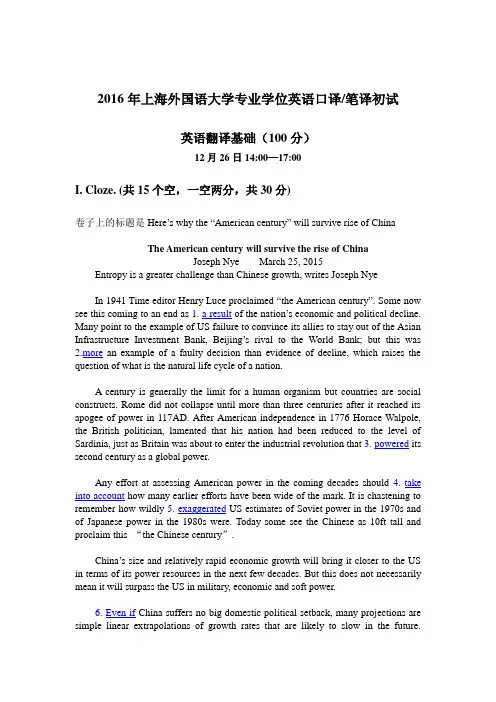
2016年上海外国语大学专业学位英语口译/笔译初试英语翻译基础(100分)12月26日14:00—17:00I. Cloze. (共15个空,一空两分,共30分)卷子上的标题是Here’s why the “American century” will survive rise of ChinaThe American century will survive the rise of ChinaJoseph Nye March 25, 2015Entropy is a greater challenge than Chinese growth, writes Joseph NyeIn 1941 Time editor Henry Luce proclaimed “the American century”. Some now see this coming to an end as 1. a result of the nation’s economic and political decline. Many point to the example of US failure to convince its allies to stay out of the Asian Infrastructure Investment Bank, Beijing’s rival to the World Bank; but this was 2.more an example of a faulty decision than evidence of decline, which raises the question of what is the natural life cycle of a nation.A century is generally the limit for a human organism but countries are social constructs. Rome did not collapse until more than three centuries after it reached its apogee of power in 117AD. After American independence in 1776 Horace Walpole, the British politician, lamented that his nation had been reduced to the level of Sardinia, just as Britain was about to enter the industrial revolution that 3. powered its second century as a global power.Any effort at assessing American power in the coming decades should 4. take into account how many earlier efforts have been wide of the mark. It is chastening to remember how wildly 5. exaggerated US estimates of Soviet power in the 1970s and of Japanese power in the 1980s were. Today some see the Chinese as 10ft tall and proclaim this “the Chinese century”.China’s size and relatively rapid economic growth will bring it closer to the US in terms of its power resources in the next few decades. But this does not necessarily mean it will surpass the US in military, economic and soft power.6. Even if China suffers no big domestic political setback, many projections are simple linear extrapolations of growth rates that are likely to slow in the future.7.Moreover, economic projections are one dimensional. They ignore US military and soft power advantages, such as the desire of students around the world to attend US universities. They also overlook China’s geopolitical 8. dis-advantages in the Asian balance of power, compared with America’s relations with Europe, Japan and India, which are likely to remain more favourable.It is not impossible that a challenger such as China, Europe, Russia, India or Brazil will surpass the US in the first half of this century but it is but not likely.On the question of absolute rather than 9. relative American decline, the US faces serious problems in areas such as debt, secondary education, income in?equality and political gridlock but these are only part of the picture. On the positive side of the ledger are favourable trends in demography, technology and energy as well as abiding factors such as geography and entrepreneurial culture.The scenarios that could 10. precipitate decline include ones in which the US overreacts to terrorist attacks by turning inwards and thus cuts itself off from the strength it obtains from openness. Alternatively it could react by overcommitting itself, and wasting blood and treasure as it did in Vietnam and Iraq.As an overall assessment, describing the 21st century as one of American decline is inaccurate and misleading. Though the US has problems it is not in absolute decline, unlike ancient Rome, and it is likely to remain more powerful than any single state in coming decades.The real problem is not that it will be overtaken by China or another contender but rather that it faces a rise in the power resources of many others—both states and non-state actors such as transnational corporations, terrorist groups and cyber criminals. And it will face an increasing number of global problems that will 11. call on our ability to organise alliances and networks.12. Contrary to the views of those who proclaim this the Chinese century, we have not entered a post-American world. But the American century of the future will not look the same as in previous decades. The US 13. share of the world economy will be smaller than it was in the middle of the past century.Furthermore, the complexity created by the rise of other countries, as well as the increased role of non-state actors, will make it harder for even America, the biggest power, to 14. wield influence and organise action. Entropy is a greater challenge than China.At the same time, even when the US had its greatest preponderance of power resources, it often failed to secure what it wanted. Those who argue that the disorder of today’s world is much worse than in the past should remember a year such as 1956,when the US was unable to prevent Soviet 15. repression of a revolt in Hungary; orthe Suez invasion by our allies Britain, France and Israel.We must not view the past through rose-tinted glasses. Now, with slightly less preponderance and a much more complex world, the American century will continue for at least a few decades, but it will look very different from when Luce first articulated it.中国崛起能终结美国世纪吗?美国哈佛大学教授约瑟夫-奈为英国《金融时报》撰稿1941年,《时代》杂志(Time)主编亨利-卢斯(Henry Luce)宣称,“美国世纪”已经来临。
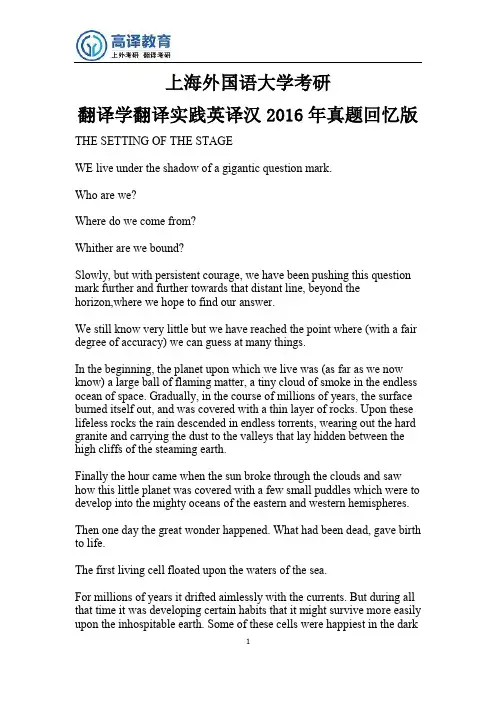
上海外国语大学考研翻译学翻译实践英译汉2016年真题回忆版THE SETTING OF THE STAGEWE live under the shadow of a gigantic question mark.Who are we?Where do we come from?Whither are we bound?Slowly, but with persistent courage, we have been pushing this question mark further and further towards that distant line, beyond thehorizon,where we hope to find our answer.We still know very little but we have reached the point where (with a fair degree of accuracy) we can guess at many things.In the beginning, the planet upon which we live was (as far as we now know) a large ball of flaming matter, a tiny cloud of smoke in the endless ocean of space. Gradually, in the course of millions of years, the surface burned itself out, and was covered with a thin layer of rocks. Upon these lifeless rocks the rain descended in endless torrents, wearing out the hard granite and carrying the dust to the valleys that lay hidden between the high cliffs of the steaming earth.Finally the hour came when the sun broke through the clouds and saw how this little planet was covered with a few small puddles which were to develop into the mighty oceans of the eastern and western hemispheres.Then one day the great wonder happened. What had been dead, gave birth to life.The first living cell floated upon the waters of the sea.For millions of years it drifted aimlessly with the currents. But during all that time it was developing certain habits that it might survive more easily upon the inhospitable earth. Some of these cells were happiest in the darkdepths of the lakes and the pools. They took root in the slimy sediments which had been carried down from the tops of the hills and they became plants. Others preferred to move about and they grew strange jointed legs, like scorpions and began to crawl along the bottom of the sea amidst the plants and the pale green things that looked like jelly-fishes. Still others (covered with scales) depended upon a swimming motion to go from place to place in their search for food, and gradually they populated the ocean with myriads of fishes.Meanwhile the plants had increased in number and they to search for new dwelling places. There was no more room for them at the bottom of the sea. Reluctantly they left the water and made a new home in the marshes and on the mud-banks that lay at the foot of the mountains. Twice a day the tides of the ocean covered them with their brine. For the rest of the time, the plants made the best of their uncomfortable situation and tried to survive in the thin air which surrounded the surface of the planet. After centuries of training, they learned how to live as comfortably in the air as they had done in the water.But some of the fishes too had begun to leave the sea, and they had learned how to breathe with lungs as well as with gills. We call such creatures amphibious, which means that they are able to live with equal ease on the land and in the water. The first frog who crosses your path can tell you all about the pleasures of the double existence of the amphibian.Once outside of the water, these animals gradually adapted themselves more and more to life on land. Some became reptiles (creatures who crawl like lizards) and they shared the silence of the forests with the insects. That they might move faster through the soft soil, they improved upon their legs and their size increased until the world was populated with gigantic forms (which the hand-books of biology list under the names of Ichthyosaurus and Megalosaurus and Brontosaurus) who grew to be thirty to forty feet long and who could have played with elephants as a full grown cat plays with her kittens.。
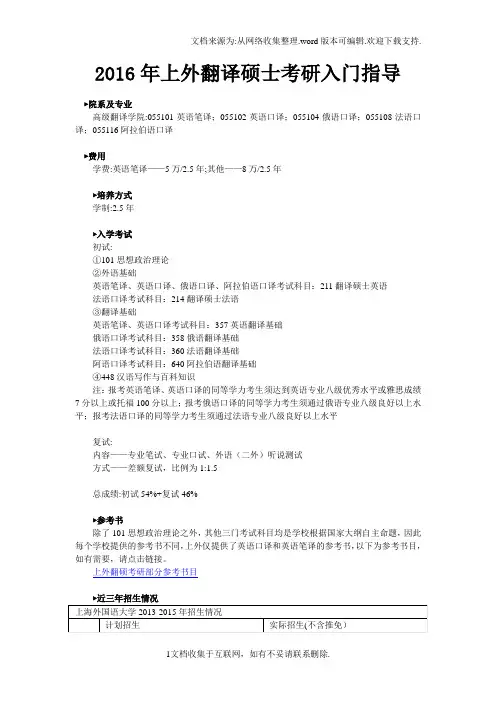
2016年上外翻译硕士考研入门指导►院系及专业高级翻译学院:055101英语笔译;055102英语口译;055104俄语口译;055108法语口译;055116阿拉伯语口译►费用学费:英语笔译——5万/2.5年;其他——8万/2.5年►培养方式学制:2.5年►入学考试初试:①101思想政治理论②外语基础英语笔译、英语口译、俄语口译、阿拉伯语口译考试科目:211翻译硕士英语法语口译考试科目:214翻译硕士法语③翻译基础英语笔译、英语口译考试科目:357英语翻译基础俄语口译考试科目:358俄语翻译基础法语口译考试科目:360法语翻译基础阿语口译考试科目:640阿拉伯语翻译基础④448汉语写作与百科知识注:报考英语笔译、英语口译的同等学力考生须达到英语专业八级优秀水平或雅思成绩7分以上或托福100分以上;报考俄语口译的同等学力考生须通过俄语专业八级良好以上水平;报考法语口译的同等学力考生须通过法语专业八级良好以上水平复试:内容——专业笔试、专业口试、外语(二外)听说测试方式——差额复试,比例为1:1.5总成绩:初试54%+复试46%►参考书除了101思想政治理论之外,其他三门考试科目均是学校根据国家大纲自主命题,因此每个学校提供的参考书不同,上外仅提供了英语口译和英语笔译的参考书,以下为参考书目,如有需要,请点击链接。
上外翻硕考研部分参考书目►近三年招生情况英语笔译英语口译俄语口译法语口译阿拉伯语口译英语笔译英语口译俄语口译法语口译阿拉伯语口译2015 46 24 10 10 5 42 29 1 2 - 2014 80 - 54 23 2 3 - 2013 80(含推免)- 28 13 2 3 -专业要多,且实际招生情况明显好于其他语种(考研帮发现,英语之外的有些语种算上推免生也出现了未能招满的情况,对于喜欢不同语种的同学来说是个不错的消息,感兴趣的同学可以去学校官网详细查询)。
►近五年分数线走势上海外国语大学2011-2015年复试技术分数要求单科(满分=100分)/单科(满分>100分)/总分英语笔译英语口译俄语口译法语口译2015 334.4 337.2 320.5 347.62014 358.8 370.1 344.1 333.52013 334 349.4 342.2 351.62012 332.3 332.2 319.8 -2011 363.3 380.9 - - 上外复试分数线不是采取的单科、总分分数线划分的方式,而是采用复试技术分分数线划分(复试技术分=业务1+业务2+外语+总分*10%)的方式。
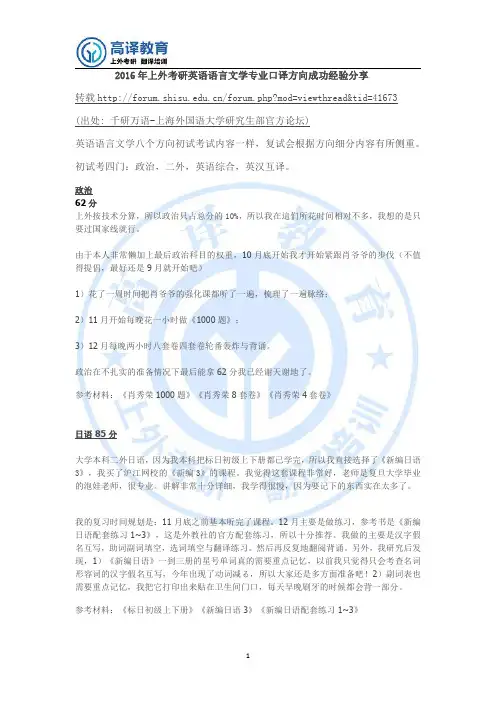
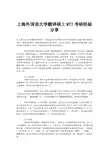
上海外国语大学翻译硕士MTI考研经验分享本人现在是上外高翻笔译研究生,因为前段时间不断有学弟学妹问我关于备考MTI的相关事宜,感觉有必要写一篇经验帖来供后来人参考。
仅是个人愚见,感觉有用的就看看,没用的也凑合着看吧~~呵呵,不过我相信还是有些用处滴~~我当初考研之前也是火急火燎,想要找到组织,想要有人接受,有人指点,遂逛遍各大论坛,遍地留QQ号,可奇怪的是竟没有一个人加我扣扣,而到第二年我考上的时候,加我的人一大把。
我很是郁闷呀,可能是当时没赶上好时间吧。
但是,话又说回来,我还是很感激当年很有爱心的学姐学哥们,他们及时在论坛上留下了回忆版真题,还有备考过程,其间经历的种种,给了我很大的启发。
作为后来人,我也很愿意分享一下自己备考过程中的酸甜苦辣,学习心得,以及备考建议。
(在此须说明一点:所谓别人成功的经验,不要盲目接受,选择最适合自己的才是最重要的哦。
最重要的一点是跟着心里的选择走,认定了就好好拼一把)关于选学校:可能在备考之处,很多人选择MTI的动机各不相同,所以就有人在纠结,我到底该报那所大学?是译专业不强的名牌大学翻,还是专业实力很强的二流大学,或者是专业实力很强的,学校又是全国重点的北上广?我的选择很简单:首先,看自己的兴趣,看自己喜欢什么专业,然后根据专业圈定几所心仪的学校。
然后根据以后的就业情况,以及是否公平公正,学校实力,报录比,学费等综合考虑。
(顺便提醒一点:上外很亲睐跨专业考翻硕的童鞋哦,绝对没有歧视哦)我看中的两点:1.专业很强,老师很强,这样自己才有可能很强。
2.学校不黑:有些学校喜欢开后门,人际关系特别那啥~特别是北方的学校,而且北方的天气空气都不太好。
相比较而言,上外广外比较好考,招生人数也多(上外今年扩招突然人数增加到了七八十人复试录取比1:1.2考进去的机会很大,广外招的人就更多了,一两百呢),所以综合保险起见,东部和东南的学校稍微更好一点,就业前景也不错。
关于学费:选择学校的时候自己要做好心里准备,一般而言,专硕的学费是相当贵的,这一点一定要想到。
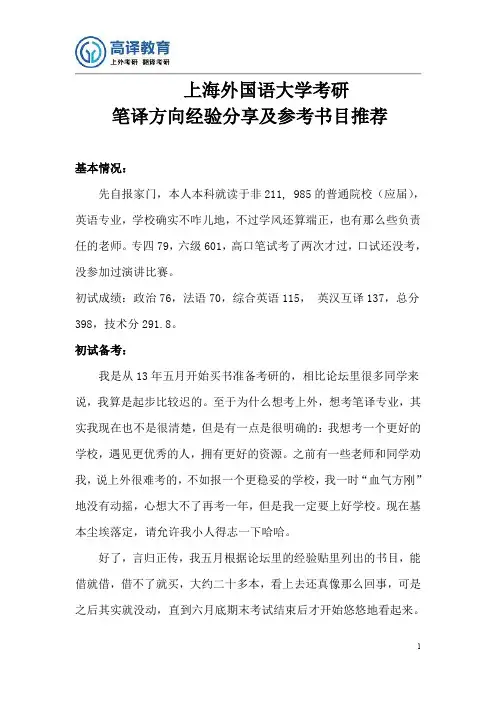
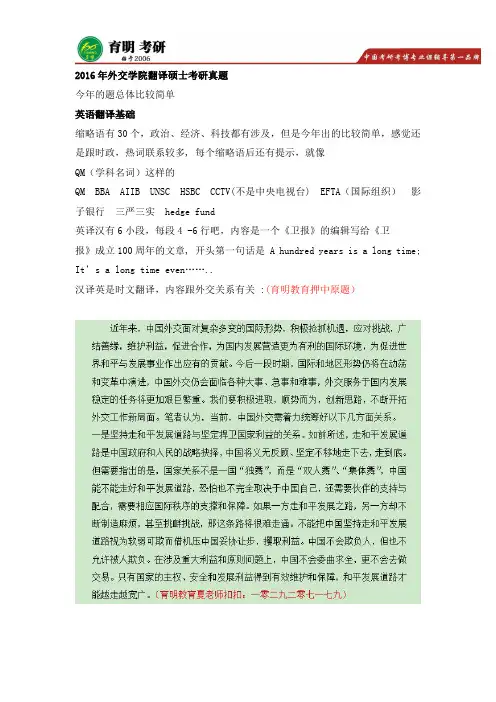
2016年外交学院翻译硕士考研真题今年的题总体比较简单英语翻译基础缩略语有30个,政治、经济、科技都有涉及,但是今年出的比较简单,感觉还是跟时政,热词联系较多,每个缩略语后还有提示,就像QM(学科名词)这样的QM BBA AIIB UNSC HSBC CCTV(不是中央电视台)EFTA(国际组织)影子银行三严三实hedge fund英译汉有6小段,每段4-6行吧,内容是一个《卫报》的编辑写给《卫报》成立100周年的文章,开头第一句话是A hundred years is a long time; It’s a long time even……..汉译英是时文翻译,内容跟外交关系有关:(育明教育押中原题)翻译硕士英语第一题是20个单选题,主要考词汇辨析,但是今年没有很长很偏的词,最后两个单选就是给出一句话,让选择选项中与所给句子中标黑的单词的同义词。
第二题是改错,有10个,考试形式跟专八改错一样,但是比专八稍简单第三题是阅读,共6篇,总体比较简单,但是问题形式多样,有一般的选择,还有判断对错(Yes or No or Not Given),多选,填文章主旨句,总之就是题型很多最后一题是作文,400词左右,写一下技术是怎样改变人们的交流方式和人际关系的。
汉语写作与百科知识今年这门科目变化挺大,但总体不难,第一题是30个选择,设计中国文化、文学、近代史(我觉得可能是因为今年是抗日战争胜利70周年,近代史的题有好几个),英美文学(主要是美国文学,但是题很少),还有跟时政有关的题,还有与朝鲜有关的题,是这样考的:新千年之际,朝韩实现了世纪握手,当时的朝韩总统是谁。
第二题是10个填空题,每个题不止一个空,全部是时政题,考了今年的矛盾文学奖、屠呦呦、达沃斯论坛及其主题、9.3阅兵、《三体》、波茨坦公告和联合国宣言……第三题是名词解释,有5个,新亚欧大陆桥、亚投行、一带一路、唯美主义、话本第四题是根据所给材料改写成通知,材料很短,就几行,改写的是关于开年度营销会的通知第五题是根据材料改写成报告,这篇比较长,材料是关于一家银行开投标会的流程报告。
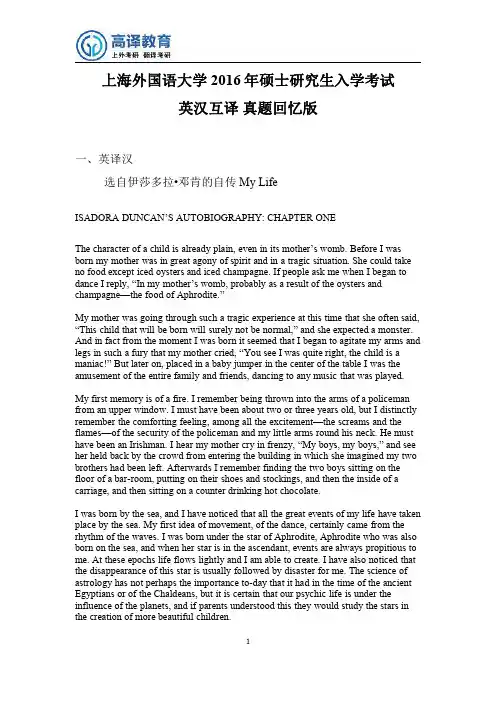
上海外国语大学2016年硕士研究生入学考试英汉互译真题回忆版一、英译汉选自伊莎多拉•邓肯的自传My LifeISADORA DUNCAN’S AUTOBIOGRAPHY:CHAPTER ONEThe character of a child is already plain,even in its mother’s womb.Before I was born my mother was in great agony of spirit and in a tragic situation.She could take no food except iced oysters and iced champagne.If people ask me when I began to dance I reply,“In my mother’s womb,probably as a result of the oysters and champagne—the food of Aphrodite.”My mother was going through such a tragic experience at this time that she often said,“This child that will be born will surely not be normal,”and she expected a monster. And in fact from the moment I was born it seemed that I began to agitate my arms and legs in such a fury that my mother cried,“You see I was quite right,the child is a maniac!”But later on,placed in a baby jumper in the center of the table I was the amusement of the entire family and friends,dancing to any music that was played. My first memory is of a fire.I remember being thrown into the arms of a policeman from an upper window.I must have been about two or three years old,but I distinctly remember the comforting feeling,among all the excitement—the screams and the flames—of the security of the policeman and my little arms round his neck.He must have been an Irishman.I hear my mother cry in frenzy,“My boys,my boys,”and see her held back by the crowd from entering the building in which she imagined my two brothers had been left.Afterwards I remember finding the two boys sitting on the floor of a bar-room,putting on their shoes and stockings,and then the inside of a carriage,and then sitting on a counter drinking hot chocolate.I was born by the sea,and I have noticed that all the great events of my life have taken place by the sea.My first idea of movement,of the dance,certainly came from the rhythm of the waves.I was born under the star of Aphrodite,Aphrodite who was also born on the sea,and when her star is in the ascendant,events are always propitious to me.At these epochs life flows lightly and I am able to create.I have also noticed that the disappearance of this star is usually followed by disaster for me.The science of astrology has not perhaps the importance to-day that it had in the time of the ancient Egyptians or of the Chaldeans,but it is certain that our psychic life is under the influence of the planets,and if parents understood this they would study the stars in the creation of more beautiful children.I believe,too,that it must make a great difference to a child’s life whether it is born by the sea or in the mountains.The sea has always drawn me to it,whereas in the mountains I have a vague feeling of discomfort and a desire to fly.They always give me an impression of being a prisoner to the earth.Looking up at their tops,I do not feel the admiration of the general tourist,but only a desire to leap over them and escape.My life and my art were born of the sea.I have to be thankful that when we were young my mother was poor.She could not afford servants or governesses for her children,and it is to this fact that I owe the spontaneous life which I had the opportunity to express as a child and never lost.My mother was a musician and taught music for a living and as she gave her lessons at the houses of her pupils she was away from home all day and for many hours in the evening.When I could escape from the prison of school,I was free.I could wander alone by the sea and follow my own fantasies.How I pity the children I see constantly attended by nurses and governesses,constantly protected and taken care of and smartly dressed.What chance of life have they?My mother was too busy to think of any dangers which might befall her children,and therefore my two brothers and I were free to follow our own vagabond impulses,which sometimes led us into adventures which,had our mother known of them,would have driven her wild with anxiety.Fortunately she was blissfully unconscious.I say fortunately for me,for it is certainly to this wild untrammeled life of my childhood that I owe the inspiration of the dance I created,which was but the expression of freedom.I was never subjectedto the continual“don’ts”which it seems to me make children’s lives a misery.二、汉译英林语堂的《秋天的况味》秋天的黄昏,一人独坐在沙发上抽烟,看烟头白灰之下露出红光,微微透露出暖气,心头的情绪便跟着那蓝烟缭绕而上,一样的轻松,一样的自由。
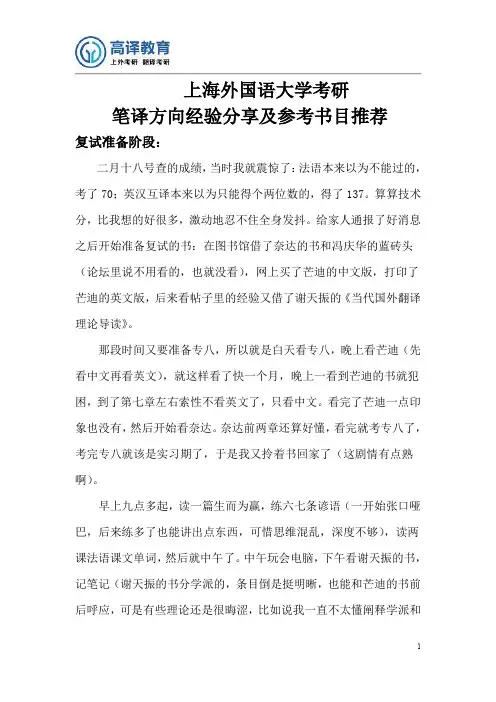
上海外国语大学考研笔译方向经验分享及参考书目推荐复试准备阶段:二月十八号查的成绩,当时我就震惊了:法语本来以为不能过的,考了70;英汉互译本来以为只能得个两位数的,得了137。
算算技术分,比我想的好很多,激动地忍不住全身发抖。
给家人通报了好消息之后开始准备复试的书:在图书馆借了奈达的书和冯庆华的蓝砖头(论坛里说不用看的,也就没看),网上买了芒迪的中文版,打印了芒迪的英文版,后来看帖子里的经验又借了谢天振的《当代国外翻译理论导读》。
那段时间又要准备专八,所以就是白天看专八,晚上看芒迪(先看中文再看英文),就这样看了快一个月,晚上一看到芒迪的书就犯困,到了第七章左右索性不看英文了,只看中文。
看完了芒迪一点印象也没有,然后开始看奈达。
奈达前两章还算好懂,看完就考专八了,考完专八就该是实习期了,于是我又拎着书回家了(这剧情有点熟啊)。
早上九点多起,读一篇生而为赢,练六七条谚语(一开始张口哑巴,后来练多了也能讲出点东西,可惜思维混乱,深度不够),读两课法语课文单词,然后就中午了。
中午玩会电脑,下午看谢天振的书,记笔记(谢天振的书分学派的,条目倒是挺明晰,也能和芒迪的书前后呼应,可是有些理论还是很晦涩,比如说我一直不太懂阐释学派和解构主义)。
晚上看奈达的书,记笔记(奈达后面的部分就有点太杂了,看着看着我就晕了,也不高兴细看,把重点记下)。
然后玩电脑,睡觉……后来把谢天振的书看完就开始看第二遍芒迪了,先看,再把重点画出来,根据论坛里分享的别人的笔记和总结记笔记。
时间有点紧,一天完成两章的样子,好歹在去上海之前看完了。
复试情况:四月八号报到。
中午就笔试,题目先举出奈达认为翻译中需要注意的几个方面:Reproducing the message, Equivalence rather than identity, Natural equivalence, The closest equivalence, The priority of meaning, The significance of style……然后问How to bring these seemingly contradicting parameters into coordination?我一看到题目愣了好久,不知道它想问什么,也不记得奈达说过什么于此相关的话。
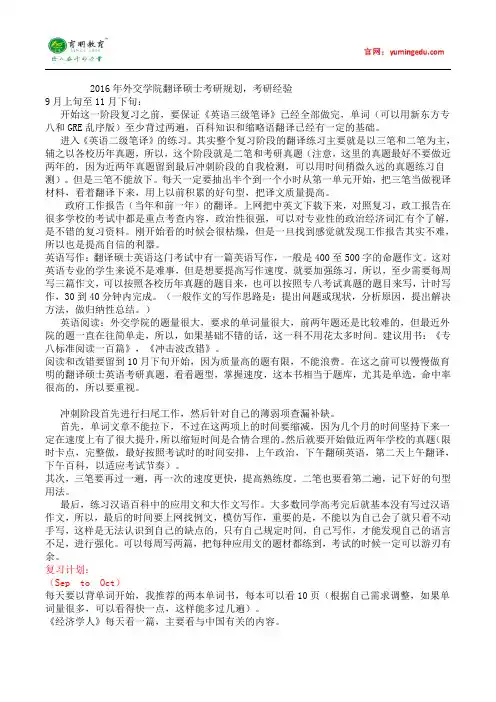
2016年外交学院翻译硕士考研规划,考研经验9月上旬至11月下旬:开始这一阶段复习之前,要保证《英语三级笔译》已经全部做完,单词(可以用新东方专八和GRE乱序版)至少背过两遍,百科知识和缩略语翻译已经有一定的基础。
进入《英语二级笔译》的练习。
其实整个复习阶段的翻译练习主要就是以三笔和二笔为主,辅之以各校历年真题,所以,这个阶段就是二笔和考研真题(注意,这里的真题最好不要做近两年的,因为近两年真题留到最后冲刺阶段的自我检测,可以用时间稍微久远的真题练习自测)。
但是三笔不能放下。
每天一定要抽出半个到一个小时从第一单元开始,把三笔当做视译材料,看着翻译下来,用上以前积累的好句型,把译文质量提高。
政府工作报告(当年和前一年)的翻译。
上网把中英文下载下来,对照复习,政工报告在很多学校的考试中都是重点考查内容,政治性很强,可以对专业性的政治经济词汇有个了解,是不错的复习资料。
刚开始看的时候会很枯燥,但是一旦找到感觉就发现工作报告其实不难,所以也是提高自信的利器。
英语写作:翻译硕士英语这门考试中有一篇英语写作,一般是400至500字的命题作文。
这对英语专业的学生来说不是难事,但是想要提高写作速度,就要加强练习,所以,至少需要每周写三篇作文,可以按照各校历年真题的题目来,也可以按照专八考试真题的题目来写,计时写作,30到40分钟内完成。
(一般作文的写作思路是:提出问题或现状,分析原因,提出解决方法,做归纳性总结。
)英语阅读:外交学院的题量很大,要求的单词量很大,前两年题还是比较难的,但最近外院的题一直在往简单走,所以,如果基础不错的话,这一科不用花太多时间。
建议用书:《专八标准阅读一百篇》,《冲击波改错》。
阅读和改错要留到10月下旬开始,因为质量高的题有限,不能浪费。
在这之前可以慢慢做育明的翻译硕士英语考研真题,看看题型,掌握速度,这本书相当于题库,尤其是单选,命中率很高的,所以要重视。
冲刺阶段首先进行扫尾工作,然后针对自己的薄弱项查漏补缺。
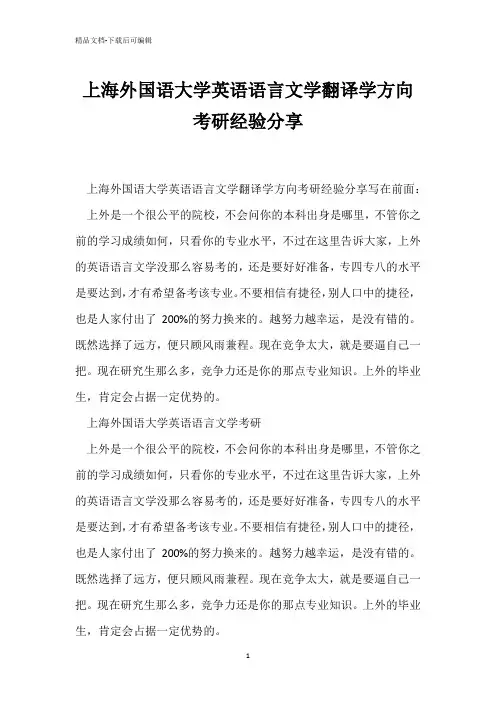
上海外国语大学英语语言文学翻译学方向考研经验分享上海外国语大学英语语言文学翻译学方向考研经验分享写在前面:上外是一个很公平的院校,不会问你的本科出身是哪里,不管你之前的学习成绩如何,只看你的专业水平,不过在这里告诉大家,上外的英语语言文学没那么容易考的,还是要好好准备,专四专八的水平是要达到,才有希望备考该专业。
不要相信有捷径,别人口中的捷径,也是人家付出了200%的努力换来的。
越努力越幸运,是没有错的。
既然选择了远方,便只顾风雨兼程。
现在竞争太大,就是要逼自己一把。
现在研究生那么多,竞争力还是你的那点专业知识。
上外的毕业生,肯定会占据一定优势的。
上海外国语大学英语语言文学考研上外是一个很公平的院校,不会问你的本科出身是哪里,不管你之前的学习成绩如何,只看你的专业水平,不过在这里告诉大家,上外的英语语言文学没那么容易考的,还是要好好准备,专四专八的水平是要达到,才有希望备考该专业。
不要相信有捷径,别人口中的捷径,也是人家付出了200%的努力换来的。
越努力越幸运,是没有错的。
既然选择了远方,便只顾风雨兼程。
现在竞争太大,就是要逼自己一把。
现在研究生那么多,竞争力还是你的那点专业知识。
上外的毕业生,肯定会占据一定优势的。
考研政治:政治的复习,不用重点,但是也不可忽略,过国家线即可,政治大家复习用的资料都是相同的,比如《红宝书》、《一千题》、《风中劲草》、《肖秀荣最后八套卷》+《最后四套卷》等,内容有的地方是相通的,大家可以根据自己的情况来进行选择,虽然政治分数占比不大,不过还是建议大家暑假开始进行复习,毕竟很多知识点是要花时间背诵的,如果自己找不到复习重点,暑假报班是最合适的时间,因为暑假是大家复习的关键时期,一定要充分利用。
上外英语语言文学考研二外法语英语语言文学是要考二外的,如果之前没有学过第二外语的同学,建议选择法语,相对其他语种来说,单词语法什么的比较好理解,语法会稍微细致一点,法语试题会稍微简单,并且比较易学,部分同学参考的是《简明。
来自一位二战圆梦上外MTI的师兄经验分享(转载)(一)基础阶段大三对我和所有的大学生来说,都是极为关键的一年。
这一年是大学学习的过渡期、分水岭,我们要面临许多选择:就业?考研?出国?其他?本文既然是高翻备考心经,那么,我就主要从考研角度叙述了。
大二后半学期时,我决定报考翻译硕士之笔译专业(我大一就决定要考研,所以,只面临选专业和选学校问题),大三上半年报考了CATTI三级笔译,复习了四五个月左右,一次性通过(其实这只是个小考试,可惜我当时把它看得太重了)。
在考CATTI 3之前,我原定学校是苏州大学,后来又变成上海对外贸易学院,最后才改为上海外国语大学。
原因很简单,就是选城市!(考研一般要三选——选专业、选城市、选学校,根据专业及个人情况不同,三选各自要有所侧重,当然最理想的情况是你所录取的院校专业牛、城市发达、学校知名度高。
)(二)一战曾经的彷徨与摇摆,原来早已在冥冥之中做好了决定。
只是那个顾虑重重、小心翼翼的自己编织了个谎言而已。
而阳光终究是要照耀到阴影之处,摇摆也终究会趋于坚定。
“既然选择了远方,便只顾风雨兼程。
”这段写在人人网上的说说和那一年的很多条心情说说一样,反映了我犹豫、迷茫而又盲目的心态。
我曾经在左右摇摆中备受煎熬,万般之下,终于做出了个“自以为是”的决定后,其实在心底里还是没有说服自己。
那时的我很焦虑很焦虑,不知道自己应作出一个什么样的决定,也苦于对上外难度的了解空洞,于是,我一次次地在问自己:我可以吗?我够格报考吗?究竟什么样水平的人才能报考这样的学校?他们都很厉害吧?但是他们究竟有多厉害呢?……这种矛盾与摇摆的心态贯穿了我的整个复习周期。
自己以为很了解一切了,其实我在一年后才发现这根本就是个谎言。
在第一年考试结束后我甚至还以为自己早已做够了一切,自己早已尽了全力——A TOTAL LIAR.就像有老师说的那样:“大部分没考进高翻的人都不知道自己是怎么死的”,可惜我知道的晚了,那一年我唯一懂得的一点就是:这场考试我根本没有准备好!怀着矛盾又极度焦虑的心情我硬着头皮坐进了考场,于是各种小失误接踵而来,而一个多月后看似3.6分的“小”落败重重敲打着我。
上外英语翻硕MTI初试备考经验-整理转载分享总:关于考试的内容。
前一年我只是不停的夯实英语基础,关于题型考试范围根本没有在意,因为第一年我打定了主意不考。
在这漫长的第一年里,我先后看过的书有很多。
翻译:翻译用的是庄绎传的翻译教程,这本书很磨人,我以很慢但很坚定的速度在今年9月完完整整的看完翻译完,每天量都不大,但是坚持每天翻译;坚持背完了《高考必备》这本书,一天4页,因为我崇拜钱钟书,钱钟书就曾背过牛津字典,我不是钱钟书,背不了牛津字典,但也用毅力背完了《高考必备》(人与人之间确实有差距,我们要正确认识差距而不是回避,然后给自己正确定位),单词我在这时已经背完了考研单词和几遍gre,所以重点背了短语,这本书最后只记住了30%左右。
然后一直到今年考试都是用温总理答记者问的内容和ZF工作报告练习翻译,我想说,这样练习效果真的很好。
庄绎传的书自我感觉还不如ZF工作报告,因为书上的有文学有历史,其遣词造句都不如ZF工作报告和答记者问上的翻译们的措词简练、实用。
上外偏重政经,因此,此为不可或缺的一环。
练完之后,我感觉自己的翻译能力真真正正提升了一个境界。
基英:众所周知,上外基础英语分三大部分,完形、阅读和作文。
完形方面,我一开始看别人的经验帖用二级笔译,只有这本书上有这个没有选项的完形这种题型,后来经过与真题对比,我知道上面的出题风格和范围与上外并不相符,于是辗转买到一个上外毕业从事教育培训的出的模拟题,我买了翻硕英语和翻译基础一共12套题,考试之前认认真真的练习,每次做完完形跟阅读我都把文章里的每一个语言点弄明白。
从一开始错误很多,到后来逐渐改善,我感觉到自己的实力真的在慢慢提升,虽然不知道能不能考上,因为对没有接触过上外的我而言,一切都是那么不真实,我不清楚上外的实力和难度。
但是我感到心安理得,我努力过,虽然出来的结果并不好,但也不后悔。
在这个过程中,很是消磨人的意志。
可能有的人一开始做题就顺风顺水,错误甚少;可是我并不是这样的人,从开始就错误百出,可以想象,一个完形里15个空,8、9个错误是多么得让人不愿去接受,可是我很坚毅,一直坚持了下来,到最后将错误控制在5个以内了,不论是做二级题还是模拟题亦或真题;这一点跟最初背诵GRE单词相似,可以想象,10个单词里面9个不认识,还要每天坚持背诵是多么让人崩溃,可是我就是因为知道自己没有资质,所以才痛下苦功,坚持背了1年半,7、8遍。
上海对外经贸大学考研翻译硕士MTI经验分享一、翻译硕士英语(100分)上外贸的翻硕英还是挺有难度的,有如下5个题型,选择、阅读、修辞、选词填空、作文。
可以买英语专业考研基础英语高分突破(全新精华版)和星火英语专业考研名校全真试卷,做做其他学校的试题,因为明年的上外贸的题型也可能会变。
(1)选择(20分)选择共20道,专八和GRE难度,没有语法题。
建议背如鱼得水记单词和乱序版的GRE(绿皮的),GRE背起来的确很痛苦,我是背了4.5遍差不多,结果还是有很多忘记了,单词每天都要背哦。
(2)阅读(20分)阅读共4篇,不太难,我是考前练了1个月差不多,拿专八练练就好。
前期不用练专八,但是大家可以买个英语文摘,中英版的,阅读的同时积累单词,很有帮助。
(3)修辞(15分)共10道,给出10-15种修辞,然后跟句子进行匹配,大家把修辞都研究一下(4)选词填空(15分)共10道,也是高难度词汇,其中有涉及到希腊神话之类的,大家暑假的时候看一下希腊神话故事这类的,网上也搜一下这方面的,今年出现了Pandora's Box、narcissism、sound and fury、platonic(5)作文(30分)拿专八作文练习就可以,400字,字迹工整,字数一定要写够!今年考的是是“电子书与纸质书”之类的话题,不偏文学,但去年考了一篇篇文学的,所以我背了很多这方面的作文,新东方的散文也看了一些,结果题型变了,但是说不准明年的情况,大家两手准备吧!二、翻译基础(150分)有如下题型,短语翻译跟篇章翻译。
(1)短语翻译(英译汉)(30分)共10个,上外贸的这道题型有点奇葩,跟其他高校的翻译硕士不一样,我背了很多专有名词以及英语笔译常用词语应试手册、育明教育的三本词汇,自己整理的各高校短语翻译,china daily上的词组,反正也积累了不少。
手头上也有很多电子资料,大家要的话可以找我。
但是最后悔的是没看哈佛商业评论,这是学姐强烈推荐的但我没怎么在意。
上海外国语大学考研翻译学备考经验分享一、个人情况介绍本人本科是广外,学英语的同学肯定说,哎呦,不错哟。
可让您失望了,我是市场营销专业的,本科唯一考过的两次满分就是线性代数和概率论呢。
但是呢,母校毕竟是外语见长的学校,对学生的英语抓得很牢,像我们专业大三还有英语课,当然和英语专业的不能比啦。
所以在此提醒各位,考英专,基础是很重要的。
不得不说,我算是非常幸运的,因为母校的英语氛围,一直没有让我的英语完全冷掉,所以我才能在大三结束的暑假不慌不忙地决定走上考研这条道路。
还有更幸运的呢,说出来你敢信?大三下,也就是人人都准备找实习,为大四正式的offer充分打下好基础的时候,我竟然跑去学日语!!!学吉他!!!参加舞蹈比赛!!!当然除却后面两样对考研没用,学习日语确实给我9月份的考研决定吃了一颗定心丸。
因为我相信冥冥之中,一切自有天意,我相信我跑去学这学那错过了名企校招的时间,是因为潜意识里的我指引着我走向考研的道路,潜意识里的我告诉自己,我尚处在知识储备阶段,过早地输出,只会是对自己的损耗。
好了,鸡汤告一段落,说说考研的事,给跨考的同学参考参考吧。
不得不说,论坛帮助了我很多,因为在准备考研之前,我对考研的了解是“0”,看完论坛之后,我的了解是“80”。
关于初试的科目呀啥的,都不说了昂,论坛里的大神快把15年的真题都搬上来了呢,不赘述。
二、我的学习计划1、初试准备9月份到10月中,上午,钱钟书《围城》英译本,每天12页精读,下午,李观仪的英语教程7,8每天一课,晚上,日语中级每天一课。
说明一下,当时的日语水平是学完了日初上下册,然后为了逼自己一把,报了12月的日语二级。
9月份没有翻译练笔,因为怕没有足够的输入前,形成错误的翻译习惯。
10月中到11月底,上午,专八真题,加完型(论坛里找的),轮着做吧反正就,没有太具体的安排。
下午翻译练笔,没有太具体规定字数,材料是张培基散文选的2,还有伦敦的叫卖声(论坛里推荐的)。
上外高翻学院介绍上海外国语大学高翻学院始建于2003年,是我国首批翻译专业硕士培养单位。
学院以培养高水平、应用型翻译人才和翻译研究人才为目标,致力于建立完善的培养体系,以培养出我国急需的高等级翻译人才和翻译研究人才。
上外考研高翻学院英语笔译专业设置介绍翻译硕士专业学位(MTI)学制2.5年,旨在培养能适应全球经济一体化及提高国家国际竞争力的需要、适应国家经济、文化、社会建设需要的高层次、应用型、专业性口笔译人才。
上外MTI有两个专业:英语笔译和英语口译上外MTI初试考试科目:翻译硕士英语、英语翻译基础、百科知识与写作、政治(全国统考)上外高翻学院MTI英语翻译基础考试题型题型:短语翻译(名词解释)、英译中、中译英考察要点:1、短语翻译:先翻译再解释,考察范围比较广2、英译中、中译英:阅读速度要快,平时多多训练上外高翻学MTI翻译硕士英语备考要点1、名词解释:china daily的英语点津板块,上面每天更新的热词设计领域广泛、偏政经且届时简洁、清晰2、英译中:文章长,题量大,翻译速度要快,注意书写,可参考《经济学人》,每周做专门的训练3、中译英:FT中文网上面找几个外国专栏作家,自己翻译完后可以对照原稿,每周做1-2篇英语二级笔译综合能力综合制定教材/教材配套辅导《高级英汉翻译理论与实践》,叶子南,北京大学出版社《高级口译教程》,梅德明,上海外语教育出版社《口译:技巧与操练》 诺兰.杰姆斯,上海外语教育出版李长栓《非文学翻译》张培基《张培基散文佳作108篇》《星火英语专业考研名校全真试题精解(英汉互译)》FT 中文网(英语学习版块中的双语阅读)上外高翻学院MTI 英语翻译基础——参考书目总结上外高翻学院MTI专业是全国名列前茅的优质专业,考取是有一定的难度,只要安排好复习计划,多下点功夫,一直坚持下去,相信大家一定可以做到的!。
上海对外经贸大学考研翻硕MTI经验分享开门见山吧,本人今年二战,经过2年的准备,积攒有充足的实战经验,不管是成功的还是不成功的。
所以,昨夜临时决定写下这篇文章,以滋后人。
一、选择上海对外经贸大学的原因首先,懂行的人都知道,学英语,尤其是考英语研究生,最理想的地方无外乎三个地方,北上广。
为什么这样说,原因只有一个,英语是一个与经济因素联系紧密的学科。
经济发达的地方英语的用途也就越广。
当然,除非你的职业理想是做教师。
上海,中国第一大城市,国际性大都市,经济中心,文化繁荣。
在这儿一年见得世面也许比内地三年见得还要多。
各种展览,活动,各种用英语的地方。
目前,上海确实有许多著名高校办的翻硕专业风生水起,然而报考它们的难度也是可想而知。
上外贸,其毕业生一直在上海地区认可度较高,因为有对外经贸的特色,毕业生找工作也有很大优势。
听学长说上外贸的师资也挺给力的,研究生老师里不乏有来自欧盟口译司的国际职业翻译官。
学校也在去年花大钱购买了专业的口译和笔译训练设备,给学生们创造了很好的学习环境。
如果你是尖子生,当然推荐你考上交,复旦,上外这些名校。
如果你基础一般,本科一般,又希望在研究生时期逆袭人生,上外贸可以是首选。
而且上外贸已经连续多年要调剂生,这就意味着一志愿被直接录取的几率很大。
而且今年上外贸也扩招了,笔译从30增加到了60人,说不准明年还会继续扩招。
而且上外贸的翻硕公费名额一直是70%。
有人也许这样说:本来还不火,你这样一说明年就火了。
那请记住:好学生还是会报考好学校的,愿意一志愿报上外贸的同学大部分都是本科一般,三本或学习一般的同学,所以只要你复习备考期间能够踏实坚持,一定能从普通的竞争者中脱颖而出,顺利被录取。
(to be totally honest,这也是我去年选择上外贸的原因)上外贸今年也成功改名,上海对外经贸大学,洋气多了吧。
下面分别从四个科目说一下我的备考经验和技巧因为家里的一些杂事,我从12年的10月开始,用了三个月来备考上外贸的MTI,实践证明只要方法正确,还是很容易取得高分的。